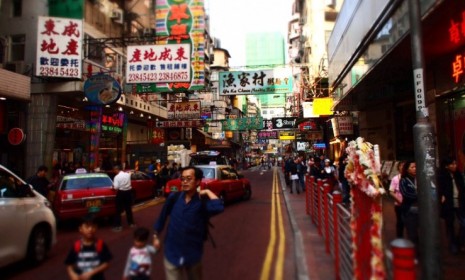Is China heading toward an economic crisis?
A new World Bank report warns that China must drastically overhaul the way it does business — or risk financial catastrophe

With the U.S. still limping its way out of the Great Recession, and Europe mired in a seemingly endless debt crisis, China has emerged from the turmoil of recent years as the engine of the global economy. China's extraordinary rise — built on three straight decades of 10 percent annual growth — is the envy of emerging economies. And China blazed to the top in its own way, deploying a heavy-handed, state-driven model that shattered assumptions about the supremacy of free-market economics. Yet in a new report, the World Bank warns that China must essentially overhaul its entire economic structure if it wants to avoid a "crisis" — and some leaders in China seem to agree. Here, a guide to China at the crossroads:
How did China get this far?
Largely by following the examples of Japan and South Korea, both of which relied on cheap labor to make cheap goods for export. At the same time, the countries industrialized rapidly by directing banks to make huge loans to government-connected conglomerates.
The Week
Escape your echo chamber. Get the facts behind the news, plus analysis from multiple perspectives.

Sign up for The Week's Free Newsletters
From our morning news briefing to a weekly Good News Newsletter, get the best of The Week delivered directly to your inbox.
From our morning news briefing to a weekly Good News Newsletter, get the best of The Week delivered directly to your inbox.
How involved is the Chinese government in the economy?
Very involved. Government-owned companies dominate the biggest industries, from energy and transportation to technology and mining. Banks are instruments of the Communist Party, distributing loans to areas of the economy that are perceived to show promise — most notably in real estate, where many fear a property bubble is developing.
Why does China need to reform?
As the world's second-largest economy, China might seem well on its way to becoming a fully industrialized country. But it's actually entering a perilous new phase that has proved to be a roadblock for dozens of up-and-comers before. The World Bank classifies China as a "middle-income status" country, meaning its annual per capita income is between $1,000 and $13,000. Of the 101 middle-income countries that emerged since 1960, only 13 became high-income nations by 2008.
A free daily email with the biggest news stories of the day – and the best features from TheWeek.com
What other challenges does China face?
The export-driven, state-investment model is producing diminishing returns. According to the World Bank, China's growth rate will slow to 5 percent by 2030 unless China changes its strategy. Remember, South Korea and Japan both went through severe financial crises in the 1990s. And China is already displaying some of the telltale symptoms: A fragile banking sector, companies engorged with debt, and unwise investments in real estate.
What reforms does China need?
The World Bank calls for nothing less than a sweeping overhaul of the system. State-owned companies should be scaled back, and private enterprise encouraged. Banks need to be independent so they can distribute capital according to the rules of risk and reward. Instead of relying on Western markets, the government should encourage Chinese citizens to consume Chinese goods — and it can do that by improving social services and bridging the yawning income gap between rich and poor.
Will China go along with these suggestions?
Remarkably, an organ of the Chinese government is a co-author of the World Bank's report. Clearly, the elite in the Communist Party are aware of the need for change. "The problem is that China's government is not taking its own advice," writes Michael Schuman at TIME. It is afraid "growth might slip" during the reform process, endangering its hold on power. In addition, China has created a host of "entrenched constituencies that will fight hard to block" any reforms, says Evan A. Feigenbaum at the Council on Foreign Relations. The actual reforms are daunting enough — but the real obstacles are political ones.
Sources: CNNMoney, Council on Foreign Relations, Time, The Wall Street Journal
-
 Which way will Trump go on Iran?
Which way will Trump go on Iran?Today’s Big Question Diplomatic talks set to be held in Turkey on Friday, but failure to reach an agreement could have ‘terrible’ global ramifications
-
 High Court action over Cape Verde tourist deaths
High Court action over Cape Verde tourist deathsThe Explainer Holidaymakers sue TUI after gastric illness outbreaks linked to six British deaths
-
 The battle over the Irish language in Northern Ireland
The battle over the Irish language in Northern IrelandUnder the Radar Popularity is soaring across Northern Ireland, but dual-language sign policies agitate division as unionists accuse nationalists of cultural erosion